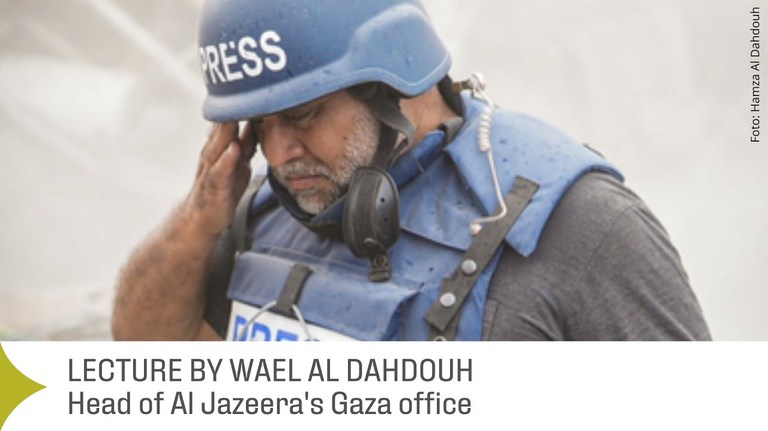

Lecture by the Gazan journalist Wael Al Dahdouh at Casa Árabe in Cordoba
Published at 16 04,,, 24 2024
ALL VIDEOS IN THIS CATEGORY
-
(3) Education, unemployment and development: challenges and opportunities
International Forum "A decade of transformations in the Arab world". 04/24/2017: Arab citizens and their development. "Education, unemployment and development: challenges and opportunities", by Khalid Abu-Ismail, ESCWA and a presentation by Gouda Abdel-Khalek, El Cairo University read by Olivia Orozco, Casa Árbe. Moderated by: Emma Hooper, CIDOB. More info: http://en.casaarabe.es/event/a-decade-of-transformations-in-the-arab-worldPublished at 45 29,,, 17 2017 -
(2) Constitutions undergoing mutation: Between legality and legitimacy (ARABIC)
International Forum "A decade of transformations in the Arab world" 04/24/2017: Crisis in the Arab State "Constitutions undergoing mutation: Between legality and legitimacy". Salwa Hamrouni, University of Tunis and Gianluca Parolin, The Aga Khan University. Moderated by Hana Jalloul, Universidad Carlos III de Madrid. More info: http://en.casaarabe.es/event/a-decade-of-transformations-in-the-arab-worldPublished at 35 29,,, 17 2017 -
(1) Authoritarianism and reconciliation in the MENA region
International Forum "A decade of transformations in the Arab world". 04/24/2017: Crisis in the Arab State "Authoritarianism and reconciliation in the MENA region". Ibrahim Fraihat, Doha Institute for Graduate Studies and Madawi al Rasheed, London School of Economics. Moderated by: Barah Mikaïl, Saint-Louis University. More info: http://en.casaarabe.es/event/a-decade-of-transformations-in-the-arab-worldPublished at 22 29,,, 17 2017 -
(5) Arab women after a decade of transformations
Casa Árabe organized this public conference as part of the International Forum on “A decade of transformations in the Arab world.” With Madawi al-Rasheed, Fatemah Farag and Hibaaq Osman. Over the last decade, we have witnessed a series of transformations in the Arab world, taking place in societies which asked for democracy while clamoring for freedom and dignity. However, Arab women continue to fall victim to discrimination, violence and the violation of their rights. There is evidence of this in the annual reports by the most important world organizations published since the 1980’s, with indicators ranking the Arab countries at the bottom in terms of gender development, measures for the empowerment and gender equality, furthering women’s role in science, women’s activity in the economy and labor market, and women’s participation in political life, as well as other indicators. This conference, which formed part of the international forum “A decade of transformation in the Arab world,” included the participation of three experts who discussed the many challenges ahead to be faced by Arab women, from different perspectives: Madawi al-Rasheed, a visiting professor at the London School of Economics (LSE) Middle East Centre; Fatemah Farag, a journalist and the founder and director of Welad Elbalad Media Services LTD, and Hibaaq Osman, the founder of al-Karama and a member of several organizations which specialize in gender-based and feminist studies. More info: http://en.casaarabe.es/event/arab-women-after-a-decade-of-transformationsPublished at 18 29,,, 17 2017 -
How are “millennials” changing the Mediterranean?
Arabisms: Festival of young creators: Conference given (05/18/2017) by Juan Cole, a professor of History at the University of Michigan, and Nesreen El Hachlaf, a lawyer and journalist in Spain. The event was moderated by Alfonso Carlos Bolado, director of the Contemporary Islam Library, Edicions Bellaterra. The youths who were born from 1982 through 2004, referred to as millennials, will become more than 70% of the developed world’s labor force in 2025. Not all groups of adolescents and youths in their twenties create historical movements focusing on their identity as young people, but it appears as though Arab millennials have. Six years ago, an urban youth movement broke onto the scene, given momentum by social and economic malaise, for the discovery of new life experiences, in confrontation with a series of regimes whose only interest lay in perpetuating their own power. But how did they do this? Juan Cole took a look at the cases of Tunisia, Egypt and Libya. At the time, people spoke of a contagious effect spreading out from Tahrir Square to Spain’s May 15th movement. Can the Arab experience be compared with that of youths in Spain? Nessrin el Hachlaf delved further into the matter, examining the case of the migrant population residing in Spain and their descendants. More info: http://en.casaarabe.es/event/arabisms-festival-of-young-creatorsPublished at 47 29,,, 17 2017





